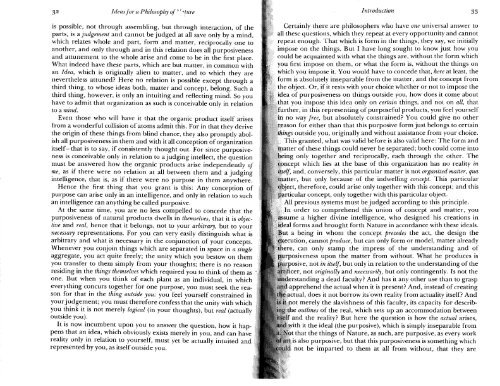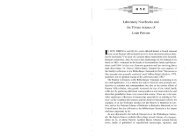Ideas for a Philosophy of Nature
Ideas for a Philosophy of Nature
Ideas for a Philosophy of Nature
You also want an ePaper? Increase the reach of your titles
YUMPU automatically turns print PDFs into web optimized ePapers that Google loves.
3 2 <strong>Ideas</strong> [or a <strong>Philosophy</strong> <strong>of</strong>" "fureIntroduction33is possible, not through assembling, but through interaction, <strong>of</strong> theparts, is a judgement and cannot be judged at all save only by a mind,which relates whole and part, <strong>for</strong>m and matter, reciprocally one toanother, and only through and in this relation does all purposivenessand attunement to the whole arise and corne to be in the first place.What indeed have these parts, which are but matter, in common withan Idea, which is originally alien to matter, and to which they arenevertheless attuned? Here no relation is possible except through athird thing, to whose ideas both, matter and concept, belong. Such athird thing, however, is only an intuiting and reflecting mind. So youhave to admit that organization as such is conceivable only in relationto a mind.Even those who will have it that the organic product itself arisesfrom a wonderful collision <strong>of</strong> atoms admit this. For in that they derivethe origin <strong>of</strong> these things from blind chance, they also promptly abolishall purposiveness in them and with it all conception o<strong>for</strong>ganizationitself- that is to say, if consistently thought out. For since purposivenessis conceivable only in relation to a judging intellect, the questionmust be answered how the organic products arise independently <strong>of</strong>me, as if there were no relation at all between them and a judgingintelligence, that is, as if there were no purpose in them anywhere.Hence the first thing that you grant is this: Any conception <strong>of</strong>purpose can arise only in an intelligence, and only in relation to suchan intelligence can anything be called purposive.At the same time, you are no less compelled to concede that thepurposiveness <strong>of</strong> natural products dwells in themselves, that it is objectiveand real, hence that it belongs, not to your arbitrary, but to yournecessary representations. For you can very easily distinguish what isarbitrary and what is necessary in the conjunction <strong>of</strong> your concepts.Whenever you conjoin things which are separated in space in a singleaggregate, you act quite freely; the unity which you bestow on themyou transfer to them simply from your thoughts; there is no reasonresiding in the things themselves which required you to think <strong>of</strong> them asone. But when you think <strong>of</strong> each plant as an individual, in whicheverything concurs together <strong>for</strong> one purpose, you must seek the reason<strong>for</strong> that in the thing outside you: you feel yourself constrained inyourjudgement; you must there<strong>for</strong>e confess that the unity with whichyou think it is not merely logical (in your thoughts), but real (actuallyoutside you).It is now incumbent upon you to answer the question, how it happensthat an idea, which obviously exists merely in you, and can havereality only in relation to yourself, must yet be actually intuited andrepresented by you, as itselfoutside you.Certainly there are philosophers who have one universal answer toall these questions, which they repeat at every opportunity and cannotrepeat enough. That which is <strong>for</strong>m in the things, they say, we initiallyimpose on the things. But I have long sought to know just how youcould be acquainted with what the things are, without the <strong>for</strong>m whichyou first impose on them, or what the <strong>for</strong>m is, without the things onwhich you impose it. You would have to concede that, here at least, the<strong>for</strong>m is absolutely inseparable from the matter, and the concept fromthe object. Or, if it rests with your choice whether or not to impose theidea <strong>of</strong> purposiveness on things outside you, how does it come abouthat you impose this idea only on certain things, and not on all, thatrther, in this representing <strong>of</strong> purposeful products, you feel yourselfno way Fee, but absolutely constrained? You could give no otherason <strong>for</strong> either than that this purposive <strong>for</strong>m just belongs to certainings outside you, originally and without assistance from your choice.This granted, what was valid be<strong>for</strong>e is also valid here: The <strong>for</strong>m andatter <strong>of</strong> these things could never be separated; both could come intoing only together and reciprocally, each through the other. Thencept which lies at the base <strong>of</strong> this organization has no reality inIf, and, conversely, this particular matter is not organized matter, quaatter, but only because <strong>of</strong> the indwelling concept. This particularUect, there<strong>for</strong>e, could arise only together with this concept; and thisrticular concept, only together with this particular object.All previous systems must be judged according to this principle,In order to comprehend this union <strong>of</strong> concept and matter, youume a higher divine intelligence, who designed his creations inal <strong>for</strong>ms and brought <strong>for</strong>th <strong>Nature</strong> in accordance with these ideals.t a being in whom the concept precedes the act, the design thecution, cannot produce, but can only <strong>for</strong>m or model, matter alreadyre, can only stamp the impress <strong>of</strong> the understanding and <strong>of</strong>posiveness upon the matter from without. What he produces isosive, not in itself, but only in relation to the understanding <strong>of</strong> theer, not originally and necessarily, but only contingently. Is not therstanding a dead faculty? And has it any other use than to grasppprehend the actual when it is present? And, instead <strong>of</strong> creatingtual, does it not borrow itsown reality from actuality itself? Andot merely the slavishness <strong>of</strong> this faculty, its capacity <strong>for</strong> describeoutlines <strong>of</strong> the real, which sets up an accommodation betweenand the reality? But here the question is how the actual arises,ith it the ideal (the purposive), which is simply inseparable fromt that the things <strong>of</strong> <strong>Nature</strong>, as such, are purposive, as every workis also purposive, but that this purposiveness is something whichnot be imparted to them at all from without, that they are



